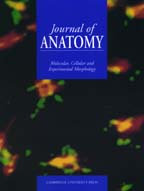Article contents
Acrosome formation during sperm transit through the epididymis in two marsupials, the tammar wallaby (Macropus eugenii) and the brushtail possum (Trichosurus vulpecula)
Published online by Cambridge University Press: 01 February 1999
Abstract
In certain Australian marsupials including the tammar wallaby (Macropus eugenii) and the brushtail possum (Trichosurus vulpecula), formation of the acrosome is not completed in the testis but during a complex differentiation process as spermatozoa pass through the epididymis. Using transmission and scanning electron microscopy this paper defined the process of acrosome formation in the epididymis, providing temporal and spatial information on the striking reorganisation of the acrosomal membranes and matrix and of the overlying sperm surface involved. On leaving the testis wallaby and possum spermatozoa had elongated ‘scoop’-shaped acrosomes projecting from the dorsal surface of the head. During passage down the epididymis, this structure condensed into the compact button-like organelle found on ejaculated spermatozoa. This condensation was achieved by a complex process of infolding and fusion of the lateral projections of the ‘scoop’. In the head of the epididymis the rims of the lateral scoop projections became shorter and thickened and folded inwards, to eventually meet midway along the longitudinal axis of the acrosome. As spermatozoa passed through the body of the epididymis the lateral projections fused together. Evidence of this fusion of the immature outer acrosomal membrane is the presence of vesicles within the acrosomal matrix which persist even in ejaculated spermatozoa. When spermatozoa have reached the tail of the epididymis the acrosome condenses into its mature form, as a small button-like structure contained within the depression on the anterior end of the nucleus. During the infolding process, the membranes associated with the immature acrosome are either engulfed into the acrosomal matrix (outer acrosomal membrane), or eliminated from the sperm head as tubular membrane elements (cytoplasmic membrane). Thus the surface and organelles of the testicular sperm head are transient structures in those marsupials with posttesticular acrosome formation and this must be taken into consideration in attempts to dissect the cell and molecular biology of fertilisation.
Keywords
- Type
- Research Article
- Information
- Copyright
- © Anatomical Society of Great Britain and Ireland 1999
- 10
- Cited by


